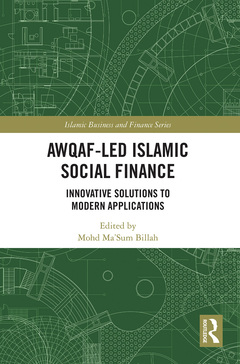Description
Awqaf-led Islamic Social Finance
Innovative Solutions to Modern Applications
Islamic Business and Finance Series
Coordinator: Billah Mohd Ma'Sum
Language: English
Subjects for Awqaf-led Islamic Social Finance:
Keywords
Cash Waqf; Waqf Institution; Waqf; Waqf Asset; Islamic finance; Waqf Properties; sustainable development goals; management of Waqf; Islamic Social Finance; Maqasid al-Shari’ah; Waqf Management; fiscal reform; Waqf Funds; product innovation; Socio-economic Development; Takaful; Muslim World; waqf Takaful; Land Waqf; challenges of Waqf; Islamic Microfinance; Waqf Administration; Islamic Bank; Blockchain Technology; MUIS; Islamic Capital Markets; Waqf Activities; Social Finance; Waqf Beneficiaries; Waqf System; OIC; Family Waqf; General Charitable Purpose; Administrator Waqf
Publication date: 04-2022
Support: Print on demand
Publication date: 09-2020
· 15.6x23.4 cm · Hardback
Description
/li>Contents
/li>Readership
/li>Biography
/li>
This book provides an authoritative and comprehensive overview of Waqf (endowment), addressing specific issues, models, solutions, structures and practices. As Islamic finance has gained in significance, so too has the institution of Waqf, working towards creating an enterprising and an entrepreneurial community across the globe, in order to meet the underlying objectives of the sustainable development goals (SDGs) by targeting the low-income group in particular.
The book analyses the historical context of Waqf as well as its revival in the digital era. It addresses the laws and policies affecting the management of Waqf, such as Maqasid al-Shari?ah, law and policies, law and fiscal reform, regulations applied within Muslim countries, judicial procedures and dispute resolutions and covers the core issues concerning the formalities of Waqf, its management and corporate governance questions. The book includes a series of specialised chapters focusing on the products and services of Waqf, covering product innovation, product development, and then assesses the risk factors in Waqf and Waqf Takaful. Finally, it focuses on the challenges of Waqf and offers recommendations for the way forward.
A timely and practical guide, comprising a literature review and future research directions, as well as a number of international case studies, this will be a key reference for academics, students, researchers, practitioners and policy makers.
Introduction Part I Awqaf: Its World View 1. Emergence of Awqaf Development Centre: A Mind-mapping Idea 2. Awqaf-Led Neo-Endowment in Supporting Socio-Economic Development 3. Objectives of Awqaf within the Classical Discourse and their Modern Implications 4. Role of Awqaf as an Economic Driver 6. The perception of waqf as a financial institution –A Lesson From the French Literature on Ottoman Empire 6. Contemporary Approach in Productive Awqaf Development 7. Utilizing Awqaf in Modern Muslim Minority Societies Part I Awqaf: Its Law and Policies 8. Gender Justice in the Law of Awqaf 9. Developing a Waqf Market and Reconceptualizing Awqaf Governance via Regtech Part III Awqaf: Its Applications and Experiences 10.Poverty Alleviation through Islamic Social Finance in Agro-sectors – An Experience of Northern Ghana 11. Developing Awqaf through Cash Waqf 12. Islamic Social Finance Reform – Hibah a Catalyst for Awqaf Advancement 113. Edu-Waqf Model – An Analysis of Selected OIC Member Countries 15. Smart Waqf City for Education – An Experience in Darussalam Gontor, Indonesia 15. Empirical Investigation on Awqaf and Its Socio-Economic Impact in Malaysia 16. Awqaf – Its ASEAN Experiences and a Lesson to Learn 17. Integrated Social and Productive Awqaf in Indonesia 18. Waqf-Led Social Finance in Poverty Alleviation-An Experience in Khyber Pakhtunkhwa, Pakistan 19. Youth Empowerment and the Application of Cash Waqf – An Experience in Kano State, Nigeria. Index.
Mohd Ma’Sum Billah is Professor of Finance and Insurance at the Islamic Economics Institute, King Abdulaziz University, Jeddah, Kingdom of Saudi Arabia.
These books may interest you

Halal Cryptocurrency Management 137.14 €



